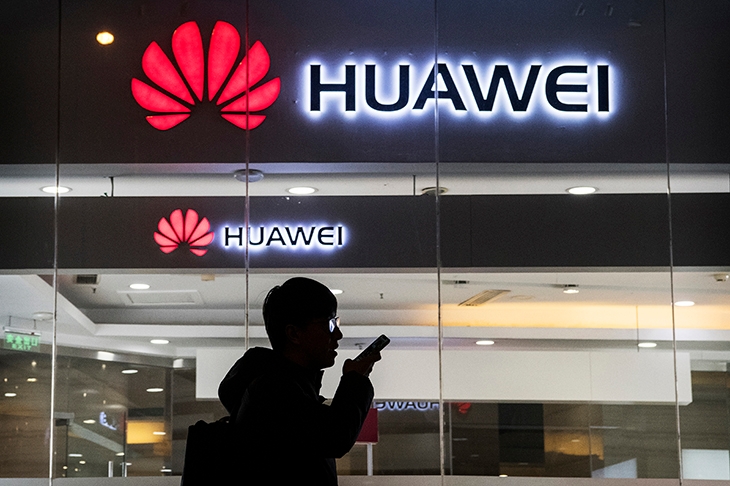On the matter of whether former defence secretary Gavin Williamson was the real ‘H’ in Line of Duty, I admit I may have lost the plot. But meanwhile the rest of the media has rather lost sight of the key issue with Huawei, the Chinese telecoms giant whose involvement in UK 5G networks was allegedly opposed by Williamson and others at a National Security Council meeting chaired by the Prime Minister. The nub of this isn’t whether or not Huawei is closely linked to the Chinese government: let’s just say that objective China-watchers are unpersuaded by assurances to the contrary, while acknowledging an element of trade-war jingoism in the way US politicians bandy the accusation. It’s also fair to acknowledge that so far as we know, Huawei hasn’t actually been proved to provide covert surveillance of US or other states’ secret communications.
The real problem is that the Huawei Cyber Security Evaluation Centre at Banbury has been unable to certify the company’s equipment as secure against sabotage. ‘Further significant technical issues have been identified,’ reported the centre in March. ‘No material progress has been made by Huawei in the remediation of the issues reported last year.’ The technical detail is beyond the layman but my eye was caught, deep in the text, by this admonition: ‘Huawei’s own internal secure coding guidelines are not routinely followed… and, in some cases, developers may be actively working to hide bad coding practice rather than fix it.’
So the trade-off is this: Huawei’s 5G technology is the world’s most advanced and likely to be cheaper than the alternatives developed by Nokia of Finland and Ericsson of Sweden, but unlikely ever to be safe enough for the transmission of secrets; it could also allow China to siphon off commercially valuable data. On the other hand, 5G might not turn out to be as exciting an advance on 4G as it’s cracked up to be, so maybe we can afford to wait and see who really offers the best value for money and the least hackable system.
More importantly, let’s not forget that western-made networks are also susceptible to sabotage, just as western telecoms companies are routinely obliged to co-operate with their own nations’ intelligence agencies — and if we could steal China’s secrets in the same way, we probably would. Nicholas Weaver, a computer security specialist at the University of California, writing on the Lawfare blog, concludes: ‘I don’t believe these risks are unique to Huawei: the dirty secret is that most of the world’s computing infrastructure is a similar nightmare.’
If I were a television dramatist, I might construct a plot in which the mastermind Theresa May greenlights a controversial purchase of Chinese telecoms equipment and leaks her own secret meeting minutes in order to advertise the decision to the world. Then she parks all the kit in a secure warehouse in Banbury and uses it only to bug the vulnerable networks of other countries that have followed her example by buying Chinese. Move over, Jed Mercurio.
Wanted: a good grocer
Sainsbury’s chief executive Mike Coupe faces a fight for his job after the Competition and Markets Authority ruled against his proposed £12 billion merger with Asda that would have created a supermarket giant bigger than Tesco and supposedly better equipped to face down the discounters Aldi and Lidl. The CMA said the deal would have harmed competition and pushed up prices, ignoring Coupe’s claims to the contrary. Investors were also unconvinced, having endured limp profits and a downward–drifting share price during Coupe’s five-year tenure.
The truth about Sainsbury’s is that its success was built on the dedicated ‘retail is detail’ focus of its founding family: that’s also how Coupe’s predecessor, Justin King, succeeded in delivering 36 consecutive quarters of sales growth. As I reported when King stood down: ‘Groceries up-front, gleaming fish, spacious aisles, helpful staff… a palpable targeting of middle-class shoppers who demand a balance of quality and value.’ Instead, Coupe chased deals, his only real win being the smaller takeover of Argos. The new Sainsbury’s chairman, Martin Scicluna, says: ‘One hundred per cent, he’s got my support.’ But watch this space — there might soon be a vacancy for a chief executive who just wants to be a good grocer.
Come on over, Warren
It’s good to know Warren Buffett is ‘ready to buy something in the UK tomorrow’ but let’s not pretend that’s all the news we need to counter the fear that Brexit chaos will be a major long-term deterrent to foreign investors. Buffett likes to ‘trust the system’ and understand the culture in places where he invests, and regards Britain as ‘awfully close’ to the US in that respect: it’s true that the English language and law, combined with relative honesty and reliability, will always make this a good place to do business. But foreign direct investment was down by a third last year and no one seriously expects it to recover any time soon: we need more than the endorsement of one 88-year-old Anglophile billionaire.
Golden eras
Under an auburn-tinted toupee, I’ve been playing camp Georgie in Make Way for Lucia, John van Druten’s stage adaption of E. F. Benson’s gently comic Mapp and Lucia novels from the 1930s. Like P.G. Wodehouse, Benson created a light-hearted middle England of leisured rentiers untouched by economic slump and the scars of war: in cultural memory, theirs became a golden interlude. I wonder whether the quarter-century that ended in 2015 will be similarly mythologised, despite its booms and busts, as a period of relative ease and harmony. Compared with the current mood of bitterness, division and insecurity, the Major-to-Cameron era already feels like a long sunlit afternoon of Earl Grey tea and cucumber sandwiches.







Comments